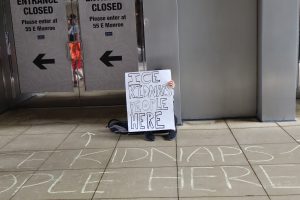Chicago officials seek to allay ICE crackdown fears
By Igor Studenkov For Chronicle Media — June 28, 2025
One of the protesters at the Chicago office building that houses immigration court (Photo by Igor Studenkov/For Chronicle Media)
Chicago officials tried to reassure Pilsen neighborhood residents that they are doing what they can to protect people from U.S. Immigration and Customs Enforcement crackdowns – while acknowledging that anything they can do has limits.
The Pilsen Neighbors Community Council and affiliated organizations put together a June 18 forum at St. Paul Church. City Clerk Anna Valencia, Deputy Mayor for Immigrant, Migrant and Refugee Rights Beatriz Ponce de Leon, Chicago Police Department Chief of Constitutional Policing and Reform Angel Novalez, and Ald. Byron Sigcho-Lopez, 25th Ward, answered questions and tried to address concerns.
Under the second Trump administration, ICE has taken a harder line on enforcement with more aggressive raids. More controversially, they had immigration courts in Chicago and other major cities dismiss cases against immigrants who were trying to legally stay in the country and detain them on site. In response, a loosely affiliated group of protesters has been rallying around the office building at 55 E. Monroe St. that houses the court.
Multiple community organizers and elected officials told Chronicle Media over the past few months that the crackdown had a chilling effect on immigrants from Mexico and other Central and South American countries, Even immigrants who have some legal status other than permanent residency are sometimes afraid to go outside, let alone participate in public events.
During the meeting, Valencia sought to address concerns about CityKey, a city-issued identification card primarily geared toward residents who may not have the documents to get a state ID – most notably, homeless residents and undocumented immigrants. Earlier that week, the Office of City Clerk halted online applications after ICE subpoenaed CityKey records. Valencia emphasized that her office still accepts applications at in-person outreach events.
“My team has been trained by the [city of Chicago] Law Department on what to do if ICE shows up in the Mobile City Hall event,” she said, adding that her office would also work with organizations that want to have private registration events.
Ponce de Leon said that the city is looking into joining lawsuits against Trump administration policies, not just the ones having to do with immigration – but they must be strategic about it.
“Lawsuits are very expensive,” she said. “We’re looking at what other cities and states are doing, and looking at where to join and where to lead.”
Alderman Sigcho-Lopez said that he would like to see more collaboration between the city and state governments. He also wanted to make sure there was no repeat of what happened with automated license plate reader traffic cameras in Mount Prospect. Illinois Secretary of State Alexi Giannoulias announced in mid-June that 46 out-of-state law enforcement agencies searched license-plate records for abortion and immigration related investigations, in violation of state law.
Chicago police’s role in enforcing immigration law was a major point of contention. One of the event organizers said that several attendees worried about CPD’s Novalez and another police officer attending a town hall at all, citing unconfirmed reports of officers collaborating with U.S. Immigration and Customs Enforcement during raids.
Novalez denied that CPD officers collaborated with ICE, but added that anyone who believes that happens should file a complaint with the Civilian Office of Police Accountability, an independent city body responsible for investigating police misconduct.
Novalez pointed to the most recent version of CPD policy for “responding to incidents involving citizenship status,” which states that police officers will not assist ICE if they have an administrative warrant to detain an immigrant for immigration law-related reason. It does specify that police officers will cooperate if the person ICE is trying to detain has a warrant signed by a judge related to a crime the person allegedly committed.
“Chicago police doesn’t coordinate and collaborate with ICE,” Novalez said, adding that victims and witnesses to crimes are treated equally “regardless of immigration status.”
“It’s very, very important that you report offenses,” he said. “Often, people are afraid to call the police because they conflate local law enforcement and federal law enforcement. What we don’t want to see is the decline in calls for service.”
The same policy also specifies that the police officers must treat witnesses and victims of crimes the same way “regardless of the citizenship or the nation of origin” of the person.
However, the officials didn’t shy away from the fact that there is nothing police can do to stop ICE from carrying out its orders, either.
“Their role is not either to help ICE or interfere with ICE,” Deputy Mayor Ponce de Leon said.
When asked whether ICE officers could be charged with trespassing for entering private businesses without warrants, Novalez said that CPD must operate under the assumption that ICE was following the law.
“My advice is to file a complaint with [ICE],” he said.
When asked whether it’s safe for immigrants to go to courthouses for what would be routine immigration appointments, Ponce de Leon responded that it was “a very challenging question,” but didn’t elaborate any further.
Novalez said that there isn’t anything police officers can do if immigrants are detained.
“When it comes to federal property, we have no control,” he said.
Alderman Sigcho-Lopez said that he supported the efforts of the community groups to keep an eye on the courts and raise money for legal defense funds such as the Midwest Immigration Bond Fund.
City Clerk Valencia admitted that there are some aspects of the city’s strategy that officials are simply not sharing with the public.
“ICE reads the paper, they’re reading the media, so we have to be strategic,” she said.







